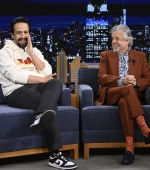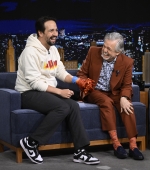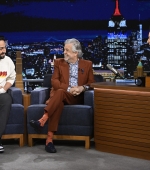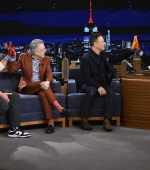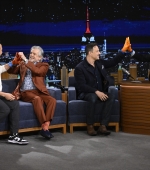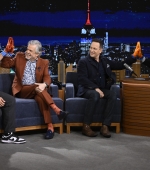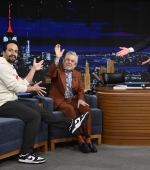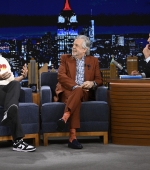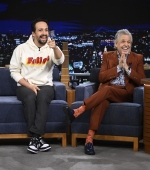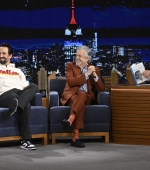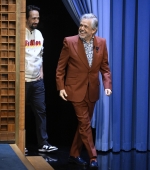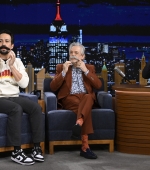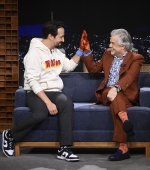Lin-Manuel Miranda interviewed his friend José Andrés over Skype for InStyle. They talk about Andrés’ efforts with World Central Kitchen and the need to “weaponize empathy” to move things forward.
Check the video below.
Under the cut you can read the written version of the conversation.
Lin-Manuel Miranda and Chef José Andrés: A Bromance That Will Save Us All
Given all that’s going on in the world, a good old-fashioned bromance feels oddly reassuring — especially when it’s between two hermanos with heart: Lin-Manuel Miranda, the Broadway megastar behind Hamilton and In the Heights, and José Andrés, the acclaimed chef and leader of World Central Kitchen, which has produced millions of meals over the past several weeks in response to the COVID-19 crisis.
They are fond of retweeting each other’s good works — whether it’s the sweatshirts Miranda curated to raise money for Broadway Cares/Equity Fights AIDS or Andrés’s hunger-relief efforts throughout New York City — and even vacation together with their families. Miranda and his father, Luis, co-wrote the foreword for Andrés’s book, We Fed an Island: The True Story of Rebuilding Puerto Rico, One Meal at a Time, about World Central Kitchen’s remarkable response to Hurricane Maria in 2017. And then there is #RecipesForThePeople — hilarious Instagram videos in which Andrés cooks with his daughters while singing along to the Hamilton soundtrack and enjoying a glass of wine. “Boom!” he yells at them. “Let’s go! It’s for today!”
Andrés himself has a life story worthy of a Miranda musical. In 1990, he was on board to work for his best friend (and future celebrity chef) Ferran Adrià at El Bulli, the gastronomic temple that would go on to garner three Michelin stars, on Spain’s Costa Brava. But after an ill-fated meeting with Adrià, Andrés was fired, and he moved to New York instead with just $50 in his pocket. Over the next 30 years, he built a restaurant empire that stretches from Washington, D.C., to Las Vegas to Disney World, then became the person everyone turns to during a crisis and found himself nominated for a Nobel Peace Prize.
How did this Spanish line cook, a son of two nurses, grow up to be a hero and a statesman? When posed with this question, Andrés, who can be very modest for someone with so much bravado, shrugs. “I only light the fire,” he says. “If anything, I give the push. Then it’s amazing men and women and — boom! — they are doing it. We’re all in this together, and everybody’s doing their part — everybody here, Lin, and so many others. And if we all do our part a little bit more, we’re going to take care of this. We will.”
What follows is an excerpt from their chat over Skype.
LIN-MANUEL MIRANDA: Maestro! Chef! Good to see you!
JOSÉ ANDRÉS: Hello, Lin! What are you drinking?
LMM: Una Coca-Cola. [laughs]
JA: Ah, like a commercial.
LMM: Cafeína, porque ya tomé mi café por el día [caffeine, because I already drank my coffee for the day] and I’m trying to ration the coffee.
JA: Coffee! Puerto Rican coffee, I’m having today. LMM: Well, I’m very proud of you. Speaking of Puerto Rico, we met actually during Hurricane Maria. We were both kind of signal-boosting from our respective departments in the world on Twitter. I just remember being struck by how you were getting to places that we hadn’t heard from. And you were filming these dispatches from where you were setting up places to serve food. And then I think I DM’d you, and you sent me a message about our friend Erin Schrode, who was on your team, because she knows all the words to In the Heights.
JA: She does.
LMM: It was such a crazy time, and you experienced it firsthand.
JA: I still remember the day that you and many others landed in San Juan bringing hope, bringing a message of love. You also brought money and things that were needed, like water. I realized that every gesture in these situations matters in ways that we don’t even understand. I connected to you and all your amazing family through Hurricane Maria. And all of a sudden, my family was like, “Wow, you look like you’ve been friends forever.” And you sent us this kind of amazing message — your words, rapping and making up that song of hope, thanking the men and women at World Central Kitchen. And we were able to deliver this to everybody. I can tell you that, for me, this was even more important than any money we were receiving from donors because this gave hope to every single cook and every person delivering the food, all across the island, who was working with us. Long story short, we were able to open 26 kitchens. We delivered almost four million meals. And everything we did was bringing the same hope that you and all your friends brought to the island. Sometimes a moment of empathy becomes a very powerful weapon.
LMM: We became friends from that because we checked in often during that time, and then I think the first time we saw each other [in person] was in D.C., probably six months later. We had a big bear hug and a lot of drinks at a hotel bar. [laughs] Let me ask you something. I feel like what’s happening right now is sort of the ultimate test of World Central Kitchen because it’s not one hot spot; it’s not one natural disaster. It is this thing that has spread across our country and our world. You’ve got something going on in San Juan, and you’ve got things going on in Detroit and Chicago, but still every day I see the places where New Yorkers can get a meal. How are you able to scale your incredible work?
JA: Just for the record: We were not really drinking. We were supporting the local economy.
LMM: It’s true.
JA: Thank you. But listen, at World Central Kitchen, we’ve been doing this now for years. Puerto Rico, I would say, was the first time we went so big so quickly. And we just came back from the Bahamas, where we prepared almost three and a half million meals and we were delivering food to 14 islands. We saw very quickly that this was going to be a humanitarian crisis, for people who were losing their jobs and had a lot of difficulty feeding their families.
At World Central Kitchen, we’re trying to bring as many people as possible together under one umbrella. We want them to be themselves, but we want all to have a clear objective, so we are not stepping on each other. So right now, we are providing meals for hundreds of hospitals, and we are partnering with hundreds of restaurants across America, making sure that money donations go directly to their employees so these places can continue doing what they do best: provide meals to the elderly, to shelters, to the homeless, to hospitals, and to the police. We are in more than 150 cities right now in the United States and growing. It’s amazing for me to see the local leaders and how important they are. They go and lead and put themselves at the service of other people.
LMM: Here’s a question I have: What is in your coffee that doesn’t seem to be in everybody else’s? Because you seem to have more energy — and this is not just true when there’s a crisis and you’re stepping up and acting, which is often, but I’ve been on vacation with you! You talk about tomatoes and sea urchins with the same urgency. ¡Tienes esa energía! [You have that energy!] What’s in the engine there, papi?
JA: I’m just good at creating mayhem and bringing the urgency of now, now. When you talk about food and you’re talking about water, the urgency of now is yesterday, Lin. Yesterday. So our teams, they have a very simple mission: Feed the hungry and bring water to the thirsty. That’s it. I’m trying to connect the dots, and in an emergency, you have the oomph, the energy, or you don’t.
LMM: I love your videos where you’re cooking all inside the time of a Hamilton song, and that’s a wide range, from King George’s three-minute song [“You’ll Be Back”] to “Non-Stop,” which is a more substantive meal. What was the thinking behind that como el pensador de esta tradición [as the thinker behind this tradition]?
JA: OK, I’m too embarrassed to say that I have a crush on Lin-Manuel.
LMM: [laughs]
JA: And I’m a guy who, since I was very young, I would always sing. I would make my own songs, and I would sing about life and about things that were very important to me. And to this day I do it, but I do it in the shower and in the bathroom, when no one sees me, of course. But I like it, and I make crazy songs — and my daughters love to sing Hamilton. Every single child I know seems to know Hamilton. You’ve done more than anybody else for the history of America by planting seeds in every child’s brain. [laughs]
I love to cook to the rhythm of music, and sometimes I make sounds with the fork and the knife, and sometimes we start singing. This [idea] began many years ago when I had a cooking show in Spain. We were running out of time, and it was a long day and everybody was tired, and I still had [to film] one entire recipe. Usually, an entire recipe would take us two hours to film. But the teams were destroyed. I was kind of destroyed. We had to finish the show because it had to go on TV two days later. I told them, “You know what I’m thinking? Give me one song.” And it was the Boléro, by [Maurice] Ravel — the music.
